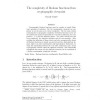139
click to vote
CCS
2010
ACM
14 years 10 months ago
2010
ACM
Cryptographic systems and protocols are the core of many Internet security procedures (such as SSL, SSH, IPSEC, DNSSEC, secure mail, etc.). At the heart of all cryptographic funct...
107
click to vote
JCS
2006
15 years 2 months ago
2006
Abstract: Cryptographic protocols are successfully analyzed using formal methods. However, formal approaches usually consider the encryption schemes as black boxes and assume that ...
118
click to vote
ENTCS
2006
15 years 2 months ago
2006
We present the first cryptographically sound security proof of the well-known Otway-Rees protocol. More precisely, we show that the protocol is secure against arbitrary active att...
103
click to vote
COMPUTER
2008
15 years 2 months ago
2008
acting the infrastructure of a cryptographic system into three core components.
120
click to vote
USENIX
1994
15 years 3 months ago
1994
As distributed computing systems grow in size, complexity and variety of application, the problem of protecting sensitive data from unauthorized disclosure and tampering becomes i...
106
click to vote
NIPS
2004
15 years 3 months ago
2004
Two neural networks that are trained on their mutual output synchronize to an identical time dependant weight vector. This novel phenomenon can be used for creation of a secure cr...
124
click to vote
CMS
2003
15 years 3 months ago
2003
We outline cryptographic key–computation from biometric data based on error-tolerant transformation of continuous-valued face eigenprojections to zero-error bitstrings suitable f...
121
click to vote
DAGSTUHL
2006
15 years 3 months ago
2006
Cryptographic Boolean functions must be complex to satisfy Shannon's principle of confusion. But the cryptographic viewpoint on complexity is not the same as in circuit compl...
DBSEC
2007
15 years 3 months ago
2007
In this paper we present the design of a scalable and secure cryptographic service that can be adopted to support large-scale networked systems, which may require strong authentica...
110
click to vote
FDTC
2006
Springer
15 years 5 months ago
2006
Springer
With physical attacks threatening the security of current cryptographic schemes, no security policy can be developed without taking into account the physical nature of computation....


